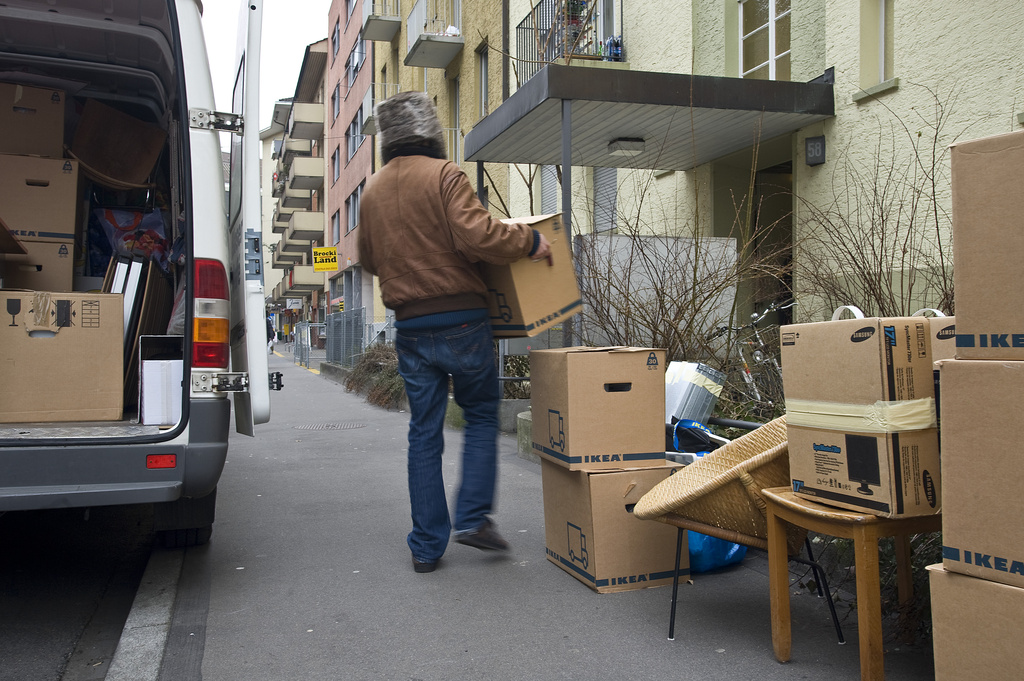Zug locals squeezed out by rising house prices

Many international companies and their workers are moving to the low-tax canton of Zug, forcing out increasing numbers of locals who can no longer afford the rent.
The city of Zug has now become the first in Switzerland to introduce special zones for “reasonably priced housing”.
Rich people from all over the world are thronging to Zug, where every nook and cranny has a price. Once affordable housing estates are bought by investors, renovated and “upgraded” to luxury business apartments.
The success of the low-tax cantons has its flip side: rich newcomers drive property prices up, causing problems for locals. Increasing numbers of native Zug inhabitants, themselves middle class, are finding themselves forced to leave their homes.
According to the Federal Statistics Office, Zug, the richest of Switzerland’s 26 cantons, has by far the highest percentage of cantonal emigration.
In order to stem this, 62 per cent of Zug voters decided to amend the construction and zoning order of 2009. From January 1, 2011, special zones for “reasonably priced housing” will enter into force.
On four plots of land with an area of 3.5 hectares, which the city added to the building zone as part of the 2008 zone revision, there are plans to build 300-700 houses affordable for the middle class. At least half the floor area is reserved for “reasonably priced housing”.
“Promising”
“Affordable” and “value for money” are relative terms in Zug. Thus a four-room house can’t cost more than SFr2,300 ($2,390) a month and a two-room house more than SFr1,475 – without additional costs.
Andrea Sidler Weiss, head of construction in the city of Zug, said social residential building had never been the aim of the regulation – the people who benefit should be those on middle incomes.
“My hope is that more people from Zug, including young people, can stay in their home canton and not be forced to move out, as is so often the case today,” she told Swiss public radio.
Lukas Bühlmann, director of the association for national planning, told public radio it was a first step – “but the creation of special zones is not enough”.
For him, the problems concerns wide sections of the population.
According to the study “Promoting residential construction that serves the public good”, carried out by the association for national planning for the Federal Housing Office and published at the beginning of 2010, Zug’s approach is “very promising”.
Although concrete experience is lacking, “manifold positive” experiences exist in similar areas. These include municipal living area plans that prevent displacement by profitable use of industrial land and services or plans for primary residence in tourist areas with which the second home is taxed.
Zurich
However, Zug is far from being the only place in Switzerland to have a problem with overpriced rent. While in low-tax cantons such as Zug or Schwyz it’s multinationals and top-earning foreigners that displace locals, in holiday resorts such as Gstaad and Zermatt the great demand for second homes is pushing up prices.
The city of Zurich on the other hand is attracting people from within Switzerland as well as from abroad, according to Brigit Wehrli, director of the centre for city development in Zurich.
“Although a lot has been built, we don’t have a particularly satisfying demand for living spaces across all price ranges,” she told swissinfo.ch. “As a result, in the places where demand is especially high more and more places are being cleaned up and converted into luxury apartments.”
According to the study mentioned above, 60 per cent of the 500 communes asked reported a general dearth of apartments to rent.
“The Zug model would in theory be interesting for Zurich, but there would need to be spaces that have not yet been built on – but there are hardly any of those in the city of Zurich,” Wehrli said.
Yet another model to that of Zug and Zurich is found in the Zug commune of Oberägeri. A couple of years ago it created a sales law for the commune concerning new zoning.
In other words, when new building land is made available, the commune can acquire a part of it and erect cheaper apartments on it.
A KPMG survey of international corporate tax found that, despite the economic downturn, the average top rate had fallen from 25.44% in 2009 to 24.99% this year.
However, indirect taxation, such as VAT, has risen from 15.41% to 15.61%.
Switzerland has for years sought to attract global firms by offering competitively low corporate tax rates.
Swiss cantons that set their own rates compete to attract European headquarters or holding companies within their borders. Smaller cantons, such as Zug or Schwyz, have been particularly successful with their campaigns.
A recent international comparison of corporate tax rates showed levies of between 12.5% and 24.5% depending on which canton a company is located in. Obwalden and Appenzell Outer Rhodes offered the lowest rate and Geneva charged firms the most.
The mean 18.8% rate of all cantons compares to 40% in the US, 33% in France, 29.4% in Germany, 28% in Britain, 17% in Singapore and 12.5% in Ireland.
Several multinational firms, such as food manufacturer Kraft, Ebay, Procter & Gamble, Microsoft, Dow Chemicals and Google have set up or have been expanding operations in Switzerland in the past few years.
However, Switzerland’s system of tax competition – effectively undercutting the rates of neighbouring countries – has drawn criticism from the European Union.
The EU considers the practice to be in violation of a 1972 free trade agreement signed between the European bloc and Switzerland. The Swiss have denied this is the case, but the row rumbles on despite a lull in proceedings in the last 18 months.
(Adapted from German by Thomas Stephens)

In compliance with the JTI standards
More: SWI swissinfo.ch certified by the Journalism Trust Initiative











You can find an overview of ongoing debates with our journalists here . Please join us!
If you want to start a conversation about a topic raised in this article or want to report factual errors, email us at english@swissinfo.ch.